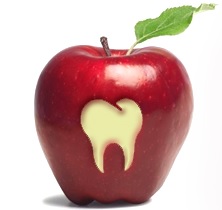 Louis Armstrong once sang ‘Smile and the whole world smiles with you’, and never a truer word was spoken. Smiling is a great reliever of stress, and a hugely important factor in our attractiveness to others. It’s a proven fact that smiling not only makes us feel better about ourselves, but also those around us and keeping our smiles healthy is one reason why so many people are encouraged by dentists to make the effort to visit regularly.
Louis Armstrong once sang ‘Smile and the whole world smiles with you’, and never a truer word was spoken. Smiling is a great reliever of stress, and a hugely important factor in our attractiveness to others. It’s a proven fact that smiling not only makes us feel better about ourselves, but also those around us and keeping our smiles healthy is one reason why so many people are encouraged by dentists to make the effort to visit regularly.
But a healthy mouth is not just intrinsic to the way we look, it can also have a positive effect on our overall state of health. While keeping our teeth clean with regular brushing and flossing, and visits to our practice helps to ensure our smiles remain bright and attractive, good oral hygiene reduces the risk of developing serious illness in other areas.
This is especially true of the heart. The most vital of organs can be badly affected by chronic gum disease, as plaque build-up – a major factor in gum disease – can stretch underneath gum tissue and allow bacteria to enter the blood stream where it binds with fat proteins. These proteins can build up, leading to clogged arteries which can obstruct the flow of blood around the body and could eventually trigger a heart attack or stroke.
Poor oral hygiene and health has been attributed to infections in other parts of the body too. Research surrounding links between infection and oral health has revealed connections between gum disease and rheumatoid arthritis and also memory loss in later years.
Diabetics too can be affected by poor oral health, as the condition often leaves the sufferer with a less efficient auto-immune system, making them more susceptible to infection and so gum disease is often more prevalent in diabetes sufferers.
There are other areas where poor oral health can have an effect on a person’s overall health, including pregnancy, so it is important that regular dentist visits are made to address any problems, and also maintaining a strict dental hygiene regime involving brushing with a good toothpaste, flossing regularly and rinsing with mouthwash. Dietary changes can also help effect good dental health.
With good oral health intrinsically linked to good physical health, it has never been more important to visit a dentist – not only to safeguard your smile, but also to safeguard your overall health. Contact our caring dental team at the office of Dr. Taskonak to schedule your next visit.
 General dentistry is more than just cleaning your teeth and checking for cavities. Our dentist also performs a screening for any signs of oral cancer. The earlier this type of cancer is detected, the better, and our dentist is in the best position to find any signs that you might miss.
General dentistry is more than just cleaning your teeth and checking for cavities. Our dentist also performs a screening for any signs of oral cancer. The earlier this type of cancer is detected, the better, and our dentist is in the best position to find any signs that you might miss.
When a dentist evaluates your oral health during your regular appointment, he will examine your tongue, gums and cheeks for any signs there might be something wrong. Some signs both you and your dentist can keep an eye out for include:
If you notice any of these problems, be sure to bring them to Dr. Taskonak’s attention. Also be sure to visit the dentist regularly. During your dental appointments, our dentist can get a good look at your mouth and will examine your oral tissues closely. It is easier for your dentist to find symptoms of oral cancer earlier than you might be able to, because of the dentist’s different perspective and expertise. As with any form of cancer, early detection increases the odds of successful treatment.
Taking care of yourself helps prevent cancer of all kinds, including oral cancer. Maintain your oral health by brushing and flossing regularly and visiting your dentist. Smoking or use of smokeless tobacco products, like chewing tobacco, greatly increases your likelihood of developing oral cancer. Excessive alcohol use can also increase your risk. Other risk factors include:
Some cases of oral cancer, however, occur in the absence of any of these risk factors. It is important, then, to keep a close eye on your oral health, see us for regular appointments, including a cancer screening, and report any unusual symptoms to our dentist for evaluation.
Contact our office if you notice any symptoms or schedule a checkup with us today!
[vc_row][vc_column][vc_column_text]
 Flossing is not only possible with braces, it’s very important to ensure your teeth remain clean and healthy during your dental treatment. Dentistry provides a challenge to everyday oral hygiene, but it’s very possible to maintain the health of your teeth even while you’re wearing braces.
Flossing is not only possible with braces, it’s very important to ensure your teeth remain clean and healthy during your dental treatment. Dentistry provides a challenge to everyday oral hygiene, but it’s very possible to maintain the health of your teeth even while you’re wearing braces.
When you’re wearing braces, it’s very important to maintain your oral health. Because parts of your teeth are covered and other parts are hard to reach, you’ll have to be extra diligent in your everyday care. One important element of your dental care regimen that you don’t want to skimp on is flossing.
Flossing can be challenging while you’re wearing braces, but special flossing tools can help you perform this vital task. Talk to our dentist about special types of floss and floss threaders that make it easier to reach between the teeth under your braces. Braces can collect extra food particles that can increase your likelihood of developing tooth decay, so flossing is an important way to keep these bits of food out from under your braces and between your teeth.
Braces mean you’ll need to be extra vigilant and extra dedicated when you clean your teeth. Carry a travel toothbrush with you so you can brush after every meal even when you’re away from home. You can also rinse your mouth and use mouthwash to keep your teeth clean and reduce the risk of tooth decay. Talk to our dentist about special tools to help overcome the challenge of oral hygiene while you’re wearing braces.
Without diligent care, you are much more likely to develop cavities because of all the additional surface area where bacteria can grow. You might also develop white spots on your teeth that are visible when your braces are removed, a side effect of plaque that develops under and around your braces. Taking good care of your teeth, flossing and brushing regularly, and following the instructions of your dentist can help ensure your teeth remain healthy while you’re wearing your braces.
For more information and tips on your dental oral health, talk to our caring and knowledgeable team by calling our office today.
[/vc_column_text][/vc_column][/vc_row]
[vc_row][vc_column][vc_column_text] Maintaining your health during pregnancy includes keeping your teeth healthy. You should maintain regular dentistry appointments and oral care throughout this special time. Our team at East Broward Dental can provide guidelines for regular care.
Maintaining your health during pregnancy includes keeping your teeth healthy. You should maintain regular dentistry appointments and oral care throughout this special time. Our team at East Broward Dental can provide guidelines for regular care.
The hormonal changes that prepare your body for pregnancy and childbirth can also have an effect on your dental health. These hormones affect the connective tissues throughout your body, including the tissues in your mouth. Your gums might become more sensitive and more prone to infection and gum disease. Your gums are also more likely to bleed during brushing while you are pregnant. This makes regular trips to the dentist important so that any symptoms of gingivitis or periodontal disease are diagnosed and treated promptly.
If you suffer from morning sickness, your teeth could also be more susceptible to decay because of increased acid in the mouth. Using a mouthwash can help reduce acid buildup on your teeth, making it less likely that this acid will lead to severe decay. If you experience any symptoms of gum disease or possible decay, be sure to bring these to our dentist’s attention as soon as possible.
Be sure to maintain your regular dental care routine during your pregnancy. Brush and floss regularly to keep your teeth clean and ensure the health of your gums. Visit the dentist for standard cleanings and other care. Our dentist will make recommendations as to how often you should have your teeth cleaned and be screened for gum disease and oral cancers.
When you visit the dentist, be sure to let the dentist know that you are pregnant. It is advisable to avoid X-rays during pregnancy. The exposure to radiation from a standard X-ray is relatively small, but because your baby is growing very quickly, the side effects of the exposure can be more severe than they are with an adult. Therefore, dentists avoid X-rays for pregnant women except in emergencies.
If you are pregnant and have questions about proper oral hygiene and dental care during pregnancy, please call our office at 954-905-2000 for more information.
[/vc_column_text][/vc_column][/vc_row]
So many of us don’t know that oral health is a very important part of the total body health. When we don’t take care of our teeth and the supporting tissues, it can cause serious health problems throughout our body.
 50% of adult have some degree of periodontal disease, which has serious consequences; for example premature, low birth-weight babies (20,000 deaths/year), pancreatic cancer (38,000 deaths/year), coronary artery disease (445,000 deaths per year).
50% of adult have some degree of periodontal disease, which has serious consequences; for example premature, low birth-weight babies (20,000 deaths/year), pancreatic cancer (38,000 deaths/year), coronary artery disease (445,000 deaths per year).
Did you know HPV can cause oral cancer, too? 75% of Americans develop HPV at some point of their lifetime. There are 8000 death per year from oral cancer.
Early detection is the key. Have your dental checkup and hygiene cleaning at least twice a year. If you see any changes, white or red spot anywhere in your mouth, lips, gum tissues, tongue or on your palate, immediately have it checked out by Dr Burak Taskonak.
Please check out the following video and share it with friend and family:
https://youtu.be/JJY2ynlXoKA?list=PLGznJJ2RfnYTt5I6PpNT7nRdnmmsoIh3i
In everyday lifestyle we don’t recognize how much synthetic materials we use and consume. Did our ancestors had tooth decay couple of thousand years ago? Was there any need for a profession called a Dentist? In fact, was cancer a main cause of death back then? Well, there is one story that says natural living is the way to go.
Of all the peoples visited by, Weston Price during his historic research expeditions of the 1930s, none elicited as much awe as the Australian Aborigines, whom he described as “a living museum preserved from the dawn of animal life on the earth”. Dr. Price was a Cleveland dentist known primarily for his theories on the relationship between nutrition, dental health, and physical health. He has been called the “Isaac Newton of Nutrition.” In his search for the causes of dental decay and physical degeneration that he observed in his dental practice, he turned from test tubes and microscopes to unstudied evidence among human beings. Dr. Price sought the factors responsible for fine teeth among the people who had them–isolated non-industrialized people. For Price, the Aborigines represented the paradigm of moral and physical perfection. Their skills in hunting, tracking and food gathering were unsurpassed. Their social organization allowed for the schooling of children from a young age. A series of initiations for the boys were designed to instill both fearlessness and respect for the welfare of the entire tribe, and respect and care for a sizable number of old people, for whom were reserved special foods that were easy to gather and hunt. Price’s photographs of Aborigines on their native diets illustrate dental structures so perfect as to make the reader wonder whether these natives were wearing false teeth. But like all the other primitive groups Price studied, the Aborigines soon succumbed to rampant tooth decay and disease of every type when they adopted the “displacing foods of modern commerce” – white flour and sugar, jams, canned foods and tea. Children born to the next generation developed irregularities of the dental arches with conspicuous facial deformities – patterns that mimicked those seen in white civilizations.
 Based on Price’s observation we can ask the question: “Are some of the health related problems we are having, because of the modern lifestyle?”. I believe we can definitely say dental decay and periodontal disease are due to dietary habits we have which constitutes more synthetic food than natural. Moreover, treating those conditions employs materials that also do not agree with our body, however,there is an alternative that is called biological or natural dentistry.
Based on Price’s observation we can ask the question: “Are some of the health related problems we are having, because of the modern lifestyle?”. I believe we can definitely say dental decay and periodontal disease are due to dietary habits we have which constitutes more synthetic food than natural. Moreover, treating those conditions employs materials that also do not agree with our body, however,there is an alternative that is called biological or natural dentistry.
Natural or Biological Dentistry means utilizing the safest, non-metal dental materials, and eliminating metals and other toxic factors from the mouth. Biological or Natural Dentistry Focuses on Whole-Body Wellness that Starts with the Mouth. Holistic (The word itself comes from “wholistic” meaning “the whole”) dentists will educate patients on the importance of overall health and how dentistry can play a role in the overall health.
All dentists to some extent see the importance of the mouth in the overall health of an individual. For instance, studies have concluded a link between gum disease and heart health, diabetes, and pregnancies. Moreover, a dental restorative material, dental amalgam, contains elemental mercury. It releases low levels of mercury vapor that can be inhaled. High levels of mercury vapor exposure are associated with adverse effects in the brain and the kidneys.
However there are materials that agree with our body and are called biological materials or biomaterials. Ceramics are the leading materials within the field of biomaterials. Unlike metals that have low biocompatibility, corrosion in a physiological environment, and mechanical properties very different from those of tissues in our body, ceramics are very biocompatible, corrosion resistant, inert, and has very low thermal and electrical conductivity. Consequently, they become the natural material of choice to restore or replace teeth. In fact, they are even used to replace hip joints.


A Titanium Dental implant and a Zirconia Dental implant.
The key way that biological dentistry can enhance physical health is to address the following areas that compromise the immune system:
In summation, if you have a splinter in your body, get it out. The same holds true if you have a dead organ or toxic metals in your mouth… get them out. If the structure is not proper, you can’t chew properly. Change it so it will work properly…
Contact Fort Lauderdale dentist Dr. Burak Taskonak at EAST BROWARD DENTAL. His expertise in cosmetic dental procedures, including tooth bonding, can give you a smile you can be proud to show off. Simply call our Fort Lauderdale office and make appointment.
Such a great experience, I am so glad that I chose that clinic. The staff is very nice, welcoming, and knowledgeable. I did a whole month of reconstruction veneers, crowns, and a bridge. Dr Beatrice Gil did an amazing job with her assistant Verena

— Oxana I.
I still have a few appointments to go before I am completed. The best people are Steven and Maria. I suffer from MASSIVE dental anxiety without these 2 people I would NOT have made it threw my appointments. I have gotten my top permanent teeth in and they are beautiful. Working on the bottoms next. I am for the first time in my life, looking forward to my next appointment.

— Dana D.
The employees are very professional they speak to you like a friend instead like a patient. Ted is very knowledgeable and does his profession very well. The studio smells great and is very clean especially their bathrooms. It was a pleasure being there. Oh, Dr Chill was great. So are all the staff.

— Marcos R.
Excellent service and the staff is very professional and mostly they care about you and your smile. My teeth look like originals, and they feel great! No pain. No discomfort. I am truly pleased, and I can smile again and eat anything I crave. Thank you, Florida Smile. Don't hold back, get it done!

— Hermen V.

Welcome to Florida Smile Studio. We are a real "smile studio" complete with all aspects of dental and facial aesthetics to include dental implants, veneers, Invisalign, general dentistry, and facial aesthetics! We also boast a renowned dental Hygiene department led by long time Hygienist Gena! Call NOW for your appointment!

1212 E Broward Boulevard, Suite 200
Fort Lauderdale, FL 33301
*Habla español
© 2024 Florida Smile Studio. All Rights Reserved. | Privacy Policy
*Available on certain procedures. Please call for more information
Website Design and Marketing by IWD Marketing